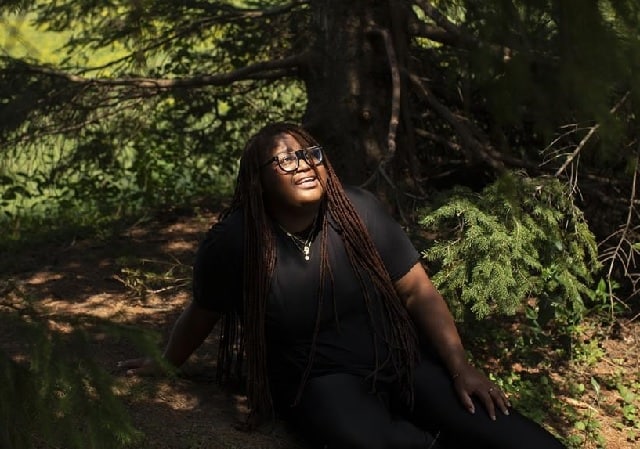Brampton filmmaker Fyffe-Marshall creating ‘ripple’ effect for Black storytelling
Published July 8, 2021 at 12:16 am

With an equal passion for Canadian cinema and humanitarianism, Brampton-based filmmaker Kelly Fyffe-Marshall’s mantra is to “make ripples where you are.”
That is the title of her 2018 TEDx Youth Toronto talk, it’s what inspired her Make Ripples Foundation, and it’s why she strives to make meaningful change in the Canadian screen industry — specifically for creators who are Black, Indigenous and people of colour.
As the director-writer soars with her acclaimed short film “Black Bodies” and upcoming features, she says she’s resisting the urge to move to the United States like so many Canadian artists do to find success. She’d rather try to help foster diversity and inclusivity here.
“Early on in my career, I remember talking to a mentor about that and she was like, ‘You have to be a martyr. You either stay and you build up and you don’t have a career, or you have a career (in the United States),’ ” Fyffe-Marshall, 32, said.
“And I, from that moment, was like: ‘No, I want both. I want to be able to have a very successful career here. But I also want to build up the industry. If no one stays, we won’t be able to build it up.’ “
Now available on digital platforms as a bonus preceding Charles Officer’s Canadian crime-noir “Akilla’s Escape,” “Black Bodies” is an artistic, five-minute look at being Black in the 21st century.
Komi Olaf is surrounded by bodies on the ground in a warehouse as he delivers a spoken-word poem about police brutality in the Toronto production. The cast also includes Donisha Rita Claire Prendergast, who is Bob Marley’s granddaughter and is also in “Akilla’s Escape.”
“Black Bodies” is the sequel to Fyffe-Marshall’s short film “Marathon” and was inspired by a traumatic experience of being racially profiled in 2018 in California.
Fyffe-Marshall said she, Olaf, Prendergast and another peer were putting suitcases in their vehicle after a four-day stay at their rental property in Rialto, Calif., when a white woman — who thought they “didn’t belong in the neighbourhood,” said the filmmaker — called police to say they were burglars.
Seven police cars and a helicopter surrounded them, said Fyffe-Marshall. Police said the group was released after about 30 minutes.
Fyffe-Marshall, whose cellphone video footage of the incident went viral online, said they felt “what it was like to be Black in America during these times, during those times — what it’s been like to be Black in this world for the last 400 years, to be honest.”
“I was dealing with a lot of what we would call PTSD (post-traumatic stress disorder) after the incident,” she said.
Fyffe-Marshall said she made “Black Bodies” to channel her emotions into something “powerful that can help a community speak up, but also help allies understand what the community is going through.”
It won a Canadian Screen Award for best live action short and made the Toronto International Film Festival’s Canada’s Top Ten list after premiering at the fest last year. Fyffe-Marshall also won the Shawn Mendes Foundation’s inaugural Changemaker Award at TIFF and the Toronto Film Critics Association’s Jay Scott Prize for an emerging artist.
But the accolades did not transfer into the momentum she expected.
When “Black Bodies” made it into this year’s Sundance Film Festival, Fyffe-Marshall tweeted there were “crickets in Canada” in terms of media coverage.
Oscar-nominated filmmaker Ava DuVernay tweeted back saying she looked forward to seeing “Black Bodies” and that Fyffe-Marshall’s “beautiful Black Women team of collaborators should make Canada proud.”
Fyffe-Marshall’s tweet then went viral, leading to more news articles and attention.
“Only five people from Canada got into Sundance and we were the only Black team from Canada, and so we — and specifically I — wanted a lot more respect, because I feel like if we were a sports team, if we were in any other field, we would have gotten a lot more respect for that,” Fyffe-Marshall said.
“I tweeted out a frustration that I feel like that’s why Canada loses so much of its stars in film to the U.S. Because really, my next step should be to go to America, because I know that’s where I’ll be able to find the career that I deserve.”
But Fyffe-Marshall is staying put.
The England-born, Afro-diasporic filmmaker said her female-run production company Sunflower Studios —which she co-founded with Tamar Bird, Iva Golubovic and Sasha Leigh Henry — pushes for diversity on their sets and established a producer-mentorship program to help BIPOC talent get the credentials they need to enter screen unions.
“It’s important for me that as I continue to go back (on sets), I continue to bring more Black and brown faces with me,” said Fyffe-Marshall, whose short film “Haven” won an Audience Choice award at 2018 SXSW festival in Austin.
“We’ve been taught so long in Canada, specifically between the BIPOC creative community, this scarcity mentality, because rarely one makes it. But we’re now at a point where all of us can make it, and so it’s important that we teach everybody what we can do so we can all do it together.”
Fyffe-Marshall said she’s now working on two feature films: “When Morning Comes,” an immigration story she plans to shoot in Jamaica, and “Summer of the Gun,” based on a deadly summer in Toronto.
She’s also developing and writing with a TV drama series with Bird and plans to direct a movie starring Destiny’s Child alumna Kelly Rowland. Meanwhile, Henry has written a sitcom, she said.
“We need to build our own voices,” said Fyffe-Marshall. “That’s the kind of stuff I want to see on TV.”
Cover photo by Chris Young, The Canadian Press.
insauga's Editorial Standards and Policies advertising





